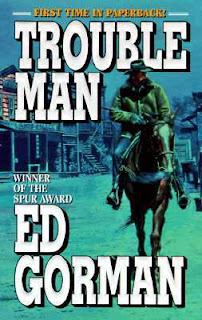Review: "Trouble Man" by Ed Gorman
Ed
Gorman’s work is reliably good. At its best it is clear, concise, meaningful, and
(best of all) entertaining. The people he creates have a melancholy hope. A hope
that often goes unfulfilled, but it is still as steady and resolute as a winter
storm. The stories are most often set in the towns and cities of Iowa. A place
that can be as welcoming or forbidding as Gorman wants it to be. A place he understands
with the clarity of a surveyor and the sorrow of a poet.
He has
successfully written in many genres, mystery, crime, science fiction, horror,
western. He is, on a foundational level, a crime writer. No matter the genre he
is writing, and while still honoring the tropes and expectations of that genre,
his stories are structured and executed with the deft plotting of the crime
story. This style and story structure is especially appealing in the western
genre where he has written many of his best novels. This can be seen in his 1998
western novel, Trouble Man.
Ray
Coyle is a faded gunfighter. He gave up the violence for a sharpshooter job in
a traveling Wild West show. When word comes that his only child, Mike, was
killed in a gunfight in Coopersville he blames himself. He taught his boy the
trade and now Mike’s dead. Ray travels to Coopersville to claim Mike’s body and
get the details of the fight that killed him. When the town’s doctor, who
doubles as undertaker, shows him the body he notices a deep gash on Mike’s
forehead. His suspicions are raised further when he meets the man who killed
Mike: Bob Trevor. Bob is the town bully and the son of the most powerful man in
the region and, to Ray’s educated eyes, incapable of beating Mike in a fair
fight. Ray decides, no matter how much pressure the town’s Sheriff applies, he
isn’t leaving Coopersville until he knows how his son was killed.
Trouble
Man
is a multilayered novel that is, at its core, a study of two fathers losing
sons – Ray and Bob Trevor’s father, Ralph – and their struggle to deal with the
loss. Ray is a sad, regretful man, and Ralph is, on the self he projects to
outsiders at least, the opposite. Ray blames himself for his son’s demise and
Ralph has protected Bob from the consequences of his bad behavior for decades.
The story, deftly and without being overbearing, is a character study of these
two men, but it is also a well-plotted, entertaining genre vehicle.
It
begins in violence and ends the same way. The story transforms more than just the
primary protagonist, Ray, and it effectively communicates the turmoil of the
human experience. But it does this without devolving into despair and, as the
story ends, a bright anticipation of a better future is revealed.
|
a
little about Ed Gorman… · Ed
Gorman wrote more than 300 books in diverse genres. He co-founded, along with
Robert J. Randisi, Mystery Scene Magazine. He won
the Western Writers of America’s Spur Award for his brilliant 1992
story, “The Face” and he was awarded the Lifetime Achievement Award from
the Private Eye Writers of America. He was nominated for a Bram Stoker
Award and an Edgar Award. Ed was born in Cedar
Rapids, Iowa on November 29, 1941, to Edward and Bernadine Gorman. He
attended Coe College and worked in advertising until becoming a full-time
writer in the mid-1980s. He died October 14, 2016, after a years-long battle with
cancer. · We
discussed Ed Gorman’s writing as by Robert David Chase in “Ed Gorman, The Warrens, and Robert David Chase”. |



I might have to look this one up. I've not tried a western from him.
ReplyDeleteCol, I'm a big fan of Ed's writing, from his short stories to his novels, and I think his westerns are some of his best work. Most are hybrid western/crime stories and should appeal to readers of both genres. But I love his straight mysteries, too.
Delete